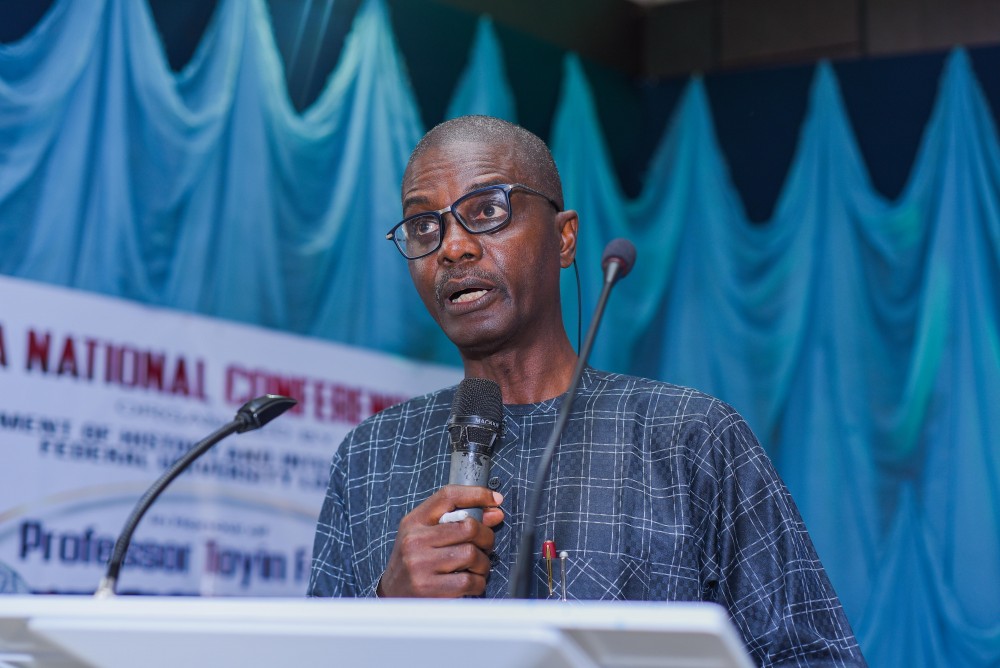Most Recent News
FUL 5TH CONVOCATION: Opening Address by the Vice-Chancellor, Prof. Olayemi Akinwumi during the National Conference Organized by the Dept. of History & Int'l Studies
-
 Chris Yahaya
Chris Yahaya
- November 10, 2021, 1:30 pm

Opening Address by the Vice-Chancellor, Federal University Lokoja, Professor Olayemi Akinwumi on the Occasion of a One-Day National Conference Organized by the Department of History and International Studies to Mark the 5th Convocation Programme at the University Auditorium, Adankolo Campus on Wednesday, 10th November, 2021
I want to sincerely welcome everyone here, especially Professor Toyin Falola, on whom this Conference is being organized. In my desire to enhance academic growth and culture, I have encouraged Departments and Faculties to come up with initiatives on how best to enhance scholarship and put the University on a global stage. This conference is one such encouragement.
This One-Day National Conference organized by the Department of History and International Studies as part of the 5th Convocation programme and in honour of one of Africa’s greatest scholars is timely for a number of reasons. First, the theme of the conference (Insurgency, Armed-Banditry and Ethno-religious Conflict in Central Nigeria) captures the most disturbing issue in our national daily lives. Hardly would any day pass that the print, online, virtual media and social platforms would not report one incidence of either insurgency, armed-banditry or ethno-religious issue. Of course, the consequences are numerous, among which is insecurity of lives and property in the region.
Second, putting up a conference to celebrate Professor Toyin Falola’s contributions to scholarship in Africa is a worthy and noble cause. In contemporary Africa, TF has more than any African scholar put the narratives of the African story on global discourse and map. He has raised and nurtured young African scholars through numerous conferences organised within and outside the continent. TF is a detribalized Nigerian, a great scholar and prolific writer whose wish and hope is for a united Nigeria where potential is harnessed for the development of the continent.
You will agree with me that, in the last decade, the Nigerian State has been besieged by devastating activities of insurgents, armed bandits, and violent non-state actors. In what appears to be a free-for-all, the entire country seems to be enmeshed in a theatre of violence, with an intensity that is unprecedented since Nigeria’s return to civil rule in 1999. Among other factors, this phenomenon has been compounded by the unchecked proliferation of arms, the porous state of the country’s borders, the seeming lack of political will to bring perpetrators to justice, and the incessant agitations for resource control. From the available literature, this phenomenon has become more manifest in Central Nigeria due to the desertification of the North East, leading to migrations to the area. The complexity of the situation is worsened by the ethnic composition of Nigeria, ethnic-politics for resource control and ethno-religious determinism, the ripple effect of which is the general insecurity of lives and property with its attendant effect on the education and economy of the people, and the gross violation of the rights of women and children, most of whom are either sexually abused or killed. In many ways, Central Nigeria is significant in the annals of Nigerian historiography.
Apart from being the convergent point of Rivers Niger and Benue, and the passageway from southern to northern Nigeria by road, Central Nigeria is critical to food production in the country. Given the region’s importance and the seemingly unending nature of the crises, the conference hopes to interrogate these boggling issues from multidisciplinary perspectives and their implications in the Nigerian State. The conference will provide a platform for scholars to interrogate the trajectories of these developments and their implications in the Nigerian State. Therefore, dear conference participants, you are welcome to the Confluence City, and particularly, Federal University Lokoja. It is my hope that the interactions and outcome of this conference will provide steps to the Nigerian government in resolving one of the most disturbing challenges that have confronted the nation.
And finally, our University is a growing University desiring partnership on the global stage. Therefore, we want to leverage the generosity and philanthropic kindness of Professor Toyin Falola to see the potential of our students and budding young scholars and consider Federal University Lokoja as an affiliation to the University of Texas at Austin. It is the hope of the University Community that your presence will benefit our students and academics through post-doctoral opportunities, among other exchange linkages.
Thank you.
Latest News
-
Iconic Leadership: Infographic Compilation of Prof. Akinwumi’s Scorecards as FUL’s 3rd VC
December 18, 2024, 10:42 pm -
FUL HR Division Organizes End-of-Year Get-together as Registrar Charges Staff on Productivity
December 16, 2024, 10:57 pm -
FUL Health Directorate Organizes Prostate Cancer Screening, Enlightenment Campaign for Male Staff
December 14, 2024, 5:14 pm -
Apply Now: Forms on Sale for FUL Diploma Programme 2025/2026 Academic Session
December 12, 2024, 5:04 pm -
Get Ready for the Most Epic Family Fun Fair Ever at Federal University Lokoja!
December 10, 2024, 5:39 pm -
FUL Management Congratulates New DSS Boss, Mr Tosin Ajayi, Solicit Continued Support
December 7, 2024, 3:28 pm -
FUL VC Condoles Family of Deceased Staff, Dr. Esther Olumide
December 4, 2024, 11:30 am -
FUL Student Wins N2M at Kogi International Carnival Music Competition
December 3, 2024, 10:30 am